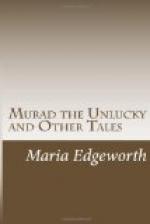“‘Then,’ said my friend, embracing me, and quitting the tone of anger which he had assumed only to try my resolution to the utmost, ’Then, Saladin, Fatima is yours.’
“I scarcely dared to believe my senses; I could not express my joy! ’Yes, my friend,’ continued the merchant, ’I have tried your prudence to the utmost, it has been victorious, and I resign my Fatima to you, certain that you will make her happy. It is true I had a greater alliance in view for her—the Pacha of Maksoud has demanded her from me; but I have found, upon private inquiry, he is addicted to the intemperate use of opium, and my daughter shall never be the wife of one who is a violent madman one-half the day and a melancholy idiot during the remainder. I have nothing to apprehend from the pacha’s resentment, because I have powerful friends with the grand vizier, who will oblige him to listen to reason, and to submit quietly to a disappointment he so justly merits. And now, Saladin, have you any objection to seeing the feast of tulips?’
“I replied only by falling at the merchant’s feet, and embracing his knees. The feast of tulips came and on that day I was married to the charming Fatima! The charming Fatima I continue still to think her, though she has now been my wife some years. She is the joy and pride of my heart; and, from our mutual affection, I have experienced more felicity than from all the other circumstances of my life, which are called so fortunate. Her father gave me the house in which I now live, and joined his possessions to ours; so that I have more wealth even than I desire. My riches, however, give me continually the means of relieving the wants of others; and therefore I cannot affect to despise them. I must persuade my brother Murad to share them with me, and to forget his misfortunes: I shall then think myself completely happy. As to the sultana’s looking-glass and your broken vase, my dear brother,” continued Saladin, “we must think of some means—”
“Think no more of the sultana’s looking-glass or of the broken vase,” exclaimed the sultan, throwing aside his merchant’s habit, and showing beneath it his own imperial vest. “Saladin, I rejoice to have heard, from your own lips, the history of your life. I acknowledge, vizier, I have been in the wrong in our argument,” continued the sultan, turning to his vizier. “I acknowledge that the histories of Saladin the Lucky and Murad the Unlucky favour your opinion, that prudence has more influence than chance in human affairs. The success and happiness of Saladin seem to me to have arisen from his prudence: by that prudence Constantinople has been saved from flames and from the plague. Had Murad possessed his brother’s discretion, he would not have been on the point of losing his head, for selling rolls which he did not bake: he would not have been kicked by a mule or bastinadoed for finding a ring: he would not have been robbed by one party of soldiers, or shot




